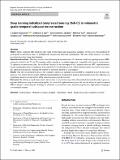Deep learning initialized compressed sensing (Deli-CS) in volumetric spatio-temporal subspace reconstruction
Author(s)
Schauman, S. S.; Iyer, Siddharth S.; Sandino, Christopher M.; Yurt, Mahmut; Cao, Xiaozhi; Liao, Congyu; Ruengchaijatuporn, Natthanan; Chatnuntawech, Itthi; Tong, Elizabeth; Setsompop, Kawin; ... Show more Show less
Download10334_2024_Article_1222.pdf (4.808Mb)
Publisher with Creative Commons License
Publisher with Creative Commons License
Creative Commons Attribution
Terms of use
Metadata
Show full item recordAbstract
Object Spatio-temporal MRI methods offer rapid whole-brain multi-parametric mapping, yet they are often hindered by prolonged reconstruction times or prohibitively burdensome hardware requirements. The aim of this project is to reduce reconstruction time using deep learning. Materials and methods This study focuses on accelerating the reconstruction of volumetric multi-axis spiral projection MRF, aiming for whole-brain T1 and T2 mapping, while ensuring a streamlined approach compatible with clinical requirements. To optimize reconstruction time, the traditional method is first revamped with a memory-efficient GPU implementation. Deep Learning Initialized Compressed Sensing (Deli-CS) is then introduced, which initiates iterative reconstruction with a DL-generated seed point, reducing the number of iterations needed for convergence. Results The full reconstruction process for volumetric multi-axis spiral projection MRF is completed in just 20 min compared to over 2 h for the previously published implementation. Comparative analysis demonstrates Deli-CS’s efficiency in expediting iterative reconstruction while maintaining high-quality results. Discussion By offering a rapid warm start to the iterative reconstruction algorithm, this method substantially reduces processing time while preserving reconstruction quality. Its successful implementation paves the way for advanced spatio-temporal MRI techniques, addressing the challenge of extensive reconstruction times and ensuring efficient, high-quality imaging in a streamlined manner.
Date issued
2025-02-01Department
Massachusetts Institute of Technology. Department of Electrical Engineering and Computer ScienceJournal
Magnetic Resonance Materials in Physics, Biology and Medicine
Publisher
Springer International Publishing
Citation
Schauman, S.S., Iyer, S.S., Sandino, C.M. et al. Deep learning initialized compressed sensing (Deli-CS) in volumetric spatio-temporal subspace reconstruction. Magn Reson Mater Phy (2025).
Version: Final published version